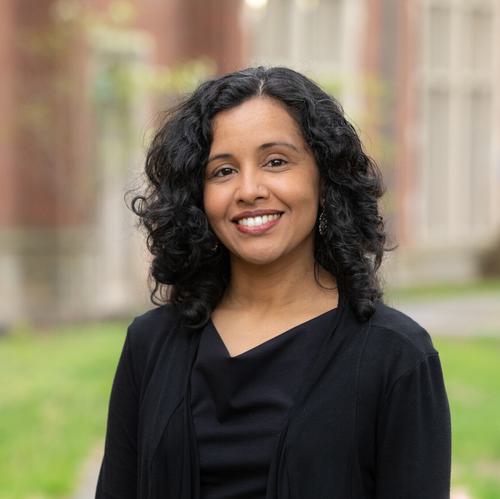
Smitha Radhakrishnan
Marion Butler McLean Professor in the History of Ideas and Professor of Sociology
Links
A feminist qualitative sociologist interested in finance, development and globalization in India, the U.S. and South Africa.
My empirical research has examined work, identity, finance, debt, and international development in India, the U.S., and South Africa. I specialize in qualitative methods, especially ethnography and interviews. In my classroom and in my writing, I pay particular attention to how contemporary forms of racial, caste, class, and gender inequality are products of the interconnected geopolitical legacies of colonialism, slavery, and the Cold War. I strive to situate individual experiences within the dynamics of a world system while always keeping an eye on building a world that better serves the global majority.
My recent book, Making Women Pay: Microfinance in Urban India, examines the taken-for-granted practices of commercial microfinance institutions in urban India, a sector that reaches over 40 million poor and working class women through small, high-interest loans. Through interviews and ethnographic work in India and the United States, this project investigates how exploitative financial practices expand to vulnerable populations while ensuring profit for lending institutions.This book has received the 2023 Honorable Mention from the ASA Sex and Gender Section and the 2024 Alice Amsden Distinguished Book Honorable Mention.
Another two recent co-authored books demonstrate my theoretical and conceptual commitments to advance a truly global sociology. The Gender Order of Neoliberalism (Polity, 2023 with Cinzia D. Solari) advances a multipolar, feminist understanding of contemporary neoliberalism, drawing from historical and empirical analyses of the former Soviet Union, India, the Philippines, and the United States. This book has received the 2024 Immanuel Wallerstein Award from the ASA’s Political Economy of World Systems Section. My edited volume with Dr. Gowri Vijayakumar, Sociology of South Asia: Postcolonial Legacies, Global Imaginaries (Palgrave-Macmillan, 2022) envisions how the discipline of sociology may be transformed when we place the region of South Asia at the center of our empirical analyses.
My first book, Appropriately Indian: Gender and Culture in a Transnational Class (Duke University Press, 2011) was a multi-sited ethnographic examination of transnational Indian information technology (IT) workers. Previously, I studied the cultural politics of post-apartheid South Africa, based on extensive research with South African Indian communities in Durban and its surrounding townships.
Currently, I am working on a large multi-sited interview-based study of household debt in Uttarakhand, India and Durban, South Africa. Data collection for this project is currently underway with collaborators in these respective locations.
At Wellesley, I teach courses that examine globalization, race, gender, and diaspora studies, among other topics. I have produced three massively open online courses on the edX platform: Global Sociology, Global Inequality, and Global Social Change. The educational materials I developed have reached thousands of learners around the world. On campus, I advocate for anti-racist transformation in our education system. I have served on numerous committees to advance the goals of inclusive excellence on our campus. Currently, I am director of the Ann Maurer ‘51 Public Speaking Program. Through this role, I aim to advance public speaking as a form of inquiry at the center of a liberal arts education.
Alongside my academic life, I perform and promote classical and contemporary Indian dance forms, especially Bharatanatyam. In 2015, I established NATyA Dance in Natick. I direct the performing ensemble NATyA Dance Collective and offer classes for children and adults.
Education
- B.A., University of California-Berkeley
- M.A., University of California-Berkeley
- Ph.D., University of California-Berkeley